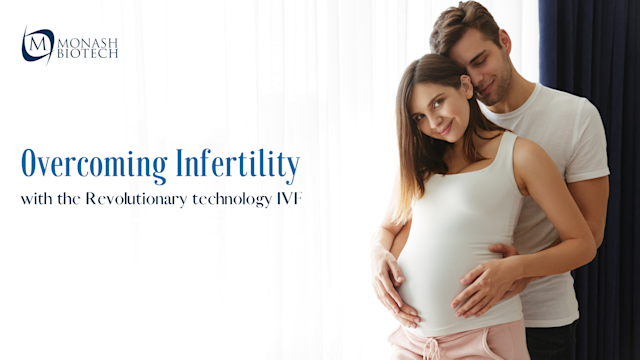Overcoming Infertility with The Revolutionary Technology IVF !
Monash Biotech
December 1st, 2023

Introduction:
Infertility can be a challenging and emotionally taxing journey for many couples longing to start a family. Fortunately, advancements in medical science have paved the way for innovative solutions, and In Vitro Fertilization (IVF) technology has emerged as a beacon of hope for those struggling with conception. IVF has revolutionized the field of reproductive medicine, offering new possibilities and renewed optimism for individuals facing infertility issues.
Understanding IVF:
In Vitro Fertilization involves the fertilization of an egg with sperm outside the body, in a laboratory setting. The process begins with the extraction of eggs from the ovaries, which are then fertilized by sperm in a controlled environment. Once fertilization occurs, the resulting embryos are carefully monitored and cultured before being transferred back into the uterus. This method has proven successful in overcoming various causes of infertility, such as blocked fallopian tubes, low sperm count, or unexplained fertility issues.
Key Components of IVF Technology:
Ovulation Induction:
IVF typically begins with ovulation induction, where medications are administered to stimulate the ovaries to produce multiple eggs. This step is crucial for increasing the chances of successful fertilization.
Egg Retrieval:
Once the eggs reach maturity, a minor surgical procedure known as egg retrieval is performed. A specialized needle is used to collect the eggs from the ovaries, guided by ultrasound imaging. The collected eggs are then placed in a culture dish for fertilization.
Fertilization:
In the laboratory, the eggs and sperm are combined, and fertilization is monitored. This step is critical, as it determines the formation of embryos that will later be transferred to the uterus.
Embryo Culture:
The resulting embryos are carefully cultured in a controlled environment for several days, allowing them to develop and reach a suitable stage for transfer. This stage is crucial for selecting the healthiest embryos with the best chance of implantation.
Embryo Transfer:
Once the embryos are ready, one or more are transferred into the uterus. This is a relatively simple and painless procedure that marks the culmination of the IVF process. Successful implantation leads to pregnancy.
Success Rates and Ongoing Improvements:
IVF technology has evolved significantly since its inception, with constant improvements in laboratory techniques and medical protocols. Success rates have steadily increased, offering hope to those undergoing treatment. Factors such as the woman’s age, the cause of infertility, and the quality of the embryos can impact success rates, but advancements in technology continue to enhance overall outcomes.
Addressing Various Causes of Infertility:
IVF has proven effective in addressing a variety of infertility issues, including tubal factor infertility, male factor infertility, endometriosis, and unexplained infertility. It provides a viable option for couples who may not have other means of conceiving naturally.
Emotional and Ethical Considerations:
While IVF has undoubtedly brought joy to countless families, it also raises ethical considerations and emotional challenges. Issues such as the disposition of unused embryos, the emotional toll of multiple treatment cycles, and the potential for multiple pregnancies are important aspects that both healthcare providers and individuals undergoing IVF must consider.
Conclusion:
In Vitro Fertilization technology has transformed the landscape of reproductive medicine, offering a lifeline to those facing infertility challenges. With ongoing research and technological advancements, the field continues to evolve, providing renewed hope and increasing success rates for couples pursuing their dream of starting a family. As IVF technology becomes more accessible and refined, it stands as a testament to the remarkable strides made in medical science to support the fundamental human desire for parenthood.